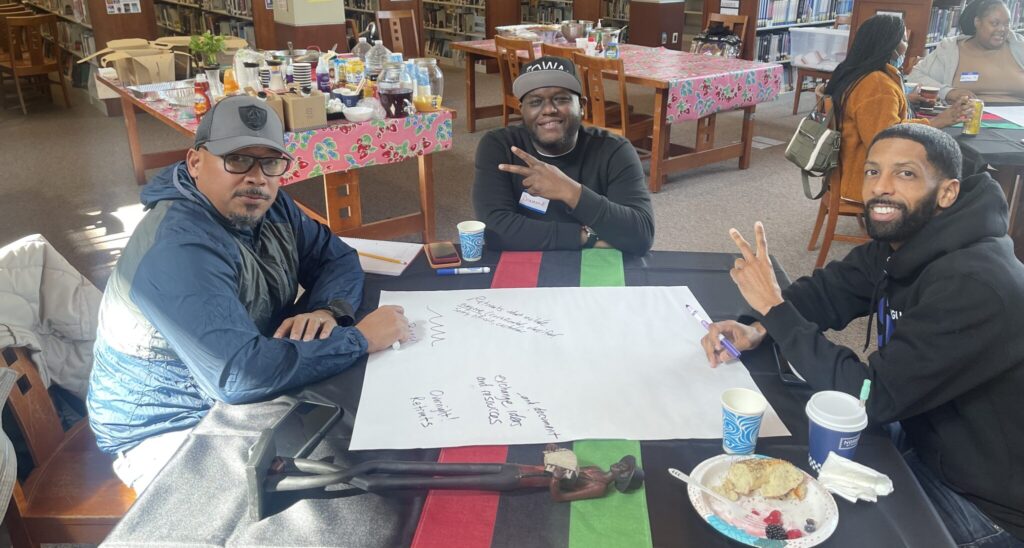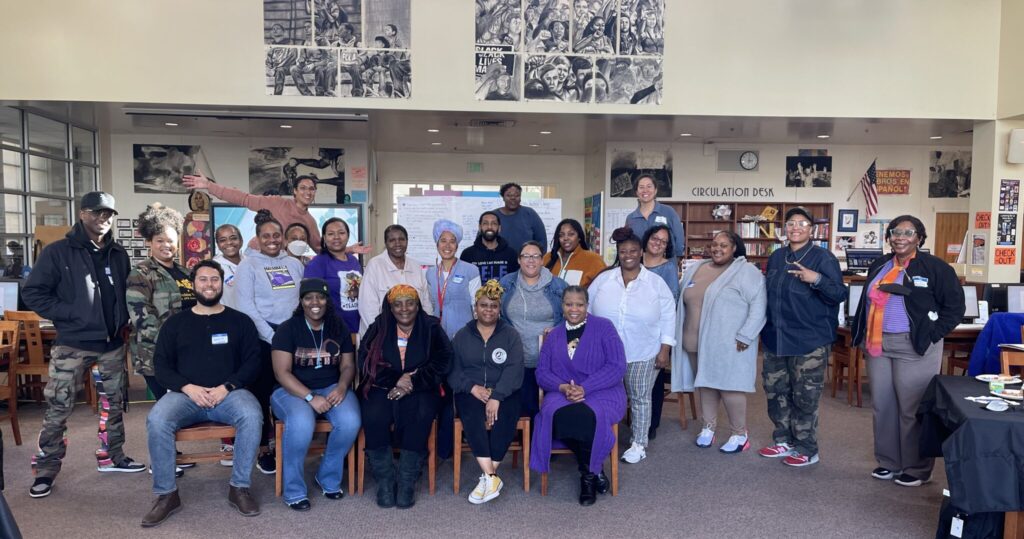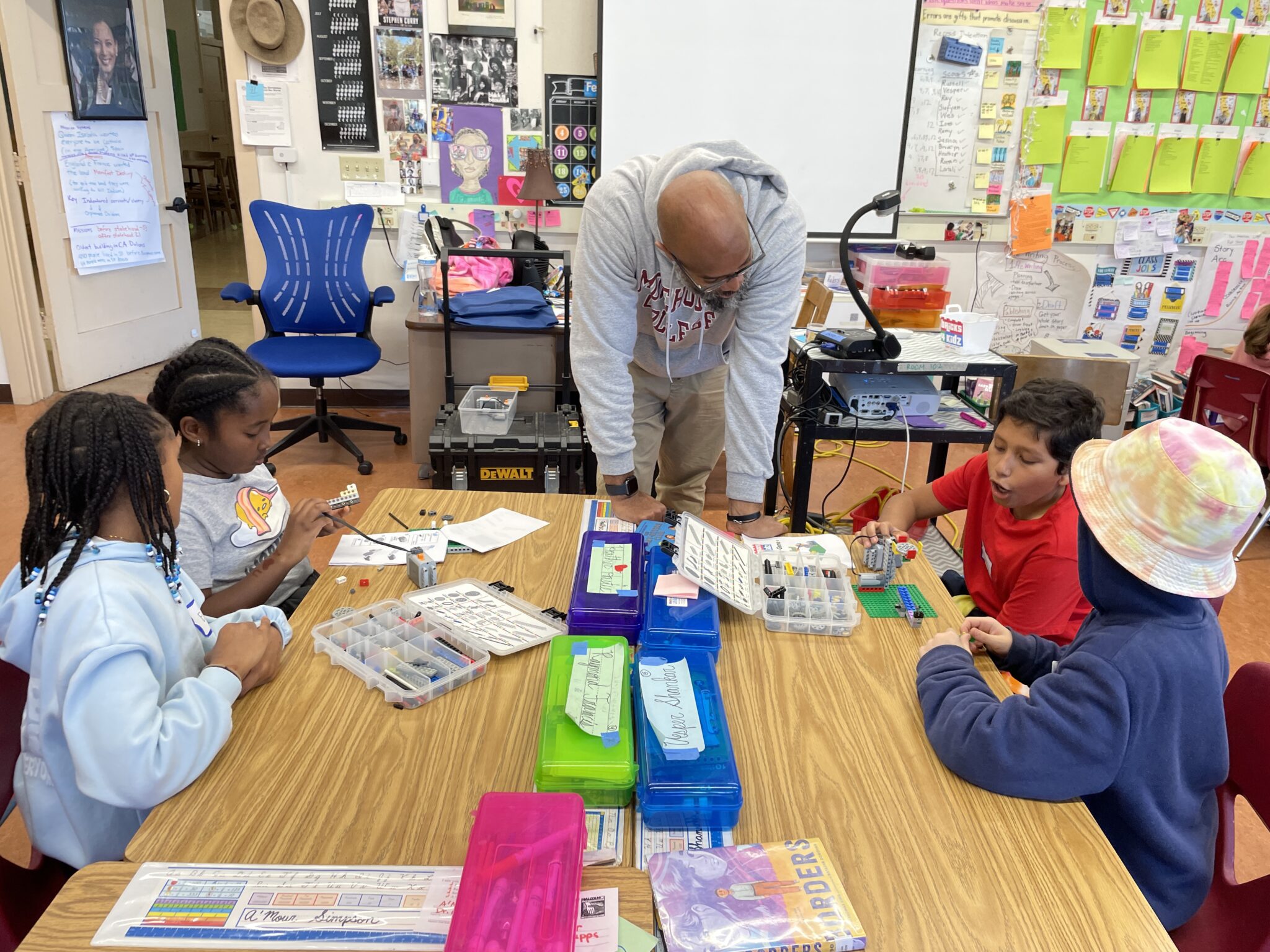“Even though we have something special here, I’m still the only Black male classroom teacher at the school. That’s why we need programs like BPACT.” —Kemal Stewart
The Berkeley Public Schools Fund believes in the transformative capacity of classroom teachers. Among the positive personal and professional qualities that can powerfully impact children, we believe that every student benefits from exposure to diverse role models and that a diverse student body should be reflected by a diverse teaching staff. So it’s from these core beliefs that we recognized something intriguing happening at Malcolm X this year: there are more Black teachers there than at other elementary schools in BUSD. We wondered why and more importantly, we wondered what impact it might be having—not just for Black students and their families who so rarely see themselves reflected in Berkeley’s teachers, but for all students and families. So we paid some visits to Malcolm X to find out.
One of the first things we learned was that a handful of Malcolm X’s Black teachers are graduates of the BPACT program, a program that receives support from a multi-year equity grant from the Berkeley Public Schools Fund. Officially titled “Berkeley Pathway to Achieve Credentialed Teachers,” the BPACT program is sometimes called the classified-to-certificated pipeline or a “Grow Your Own” program. BPACT selects promising “classified” educators who are already working within BUSD (often as Instructional Assistants or in the after school program) and provides them with tuition support toward earning a teaching credential. Alex Hunt, Malcolm X’s Principal, endorsed BPACT, noting “Classified staff who have been working in schools for a while prior to pursuing a credentialing program bring a wealth of experience and skill in working with children to the table that you don’t typically see with candidates fresh out of a credentialing program.” Upon credentialing, BPACT graduates are prioritized for teaching positions in BUSD.
The Benefits for Black Students and their Families
 LaChelle McDaniels, a BPACT graduate, has spent the past 10 years teaching at Malcolm X. Prior to becoming a certificated teacher, she served as Malcolm X’s LEARNS Coordinator. McDaniels sees the impact her presence, and that of other Black teachers, has on Black students every single day. “Everyday when I walk down the hallway, I see African-American kids I don’t know smile and wave at me as if they feel proud. It’s amazing to think that they feel proud to see an adult who looks like them in a professional manner.”
LaChelle McDaniels, a BPACT graduate, has spent the past 10 years teaching at Malcolm X. Prior to becoming a certificated teacher, she served as Malcolm X’s LEARNS Coordinator. McDaniels sees the impact her presence, and that of other Black teachers, has on Black students every single day. “Everyday when I walk down the hallway, I see African-American kids I don’t know smile and wave at me as if they feel proud. It’s amazing to think that they feel proud to see an adult who looks like them in a professional manner.”
Mrs. Crafton, a Malcolm X parent and mom to two Black boys, described the differences she’s noticing in her son’s school work this year which she attributes to having a Black male teacher. She said her son is doing more math this year, and more listening. He also is “staying focused on his work and less on the distractions around him. He has this confidence that we hadn’t seen before, and if he makes a mistake, he is more humble about it than he was before.”
While research is still trying to unpack the impact of a teacher’s race or ethnicity on the achievement of their students, there is a growing body of evidence that Black teachers maintain higher expectations for Black students, and as a result, Black students perform better. Further research suggests that when minority students have at least one same-race teacher, this improves not only academic achievement but also attendance while reducing suspensions.
 The teacher Crafton was referring to is Kemal Stewart. Stewart is also a BPACT graduate. Having first taught in after school programs, Stewart then spent several years as the LEARNS Coordinator at Willard before completing his teaching credential three years ago. After trying out a few different BUSD elementary schools, Stewart has found his teaching home at Malcolm X which also happens to be his childhood alma mater.
The teacher Crafton was referring to is Kemal Stewart. Stewart is also a BPACT graduate. Having first taught in after school programs, Stewart then spent several years as the LEARNS Coordinator at Willard before completing his teaching credential three years ago. After trying out a few different BUSD elementary schools, Stewart has found his teaching home at Malcolm X which also happens to be his childhood alma mater.
Like McDaniels, Stewart knows his presence is making a difference. “I can see it. I can see them thinking ‘this’ can actually exist: I’m a Black man. I was born and raised in this area. I understand the lingo kids use, I know the culture…and, you know, I’m a professional – I take care of business. Students have a certain type of connection with me.”
The benefits of Black teachers ripple out beyond students to the parents as well. “There is a sense of pride,” McDaniels noted. Mrs. Crafton concurred, “We were ecstatic that one of our boys was going to have a Black male teacher…something my husband and I grew up with in the 60s and 70s.”
Benefits for ALL Students
“These benefits extend beyond Black students and their families,” Stewart emphasizes. “It’s not solely about my identity as a Black individual; it’s about fostering inclusivity for all. Every child, regardless of race or background, deserves representation. It’s crucial for white children, Asian children, and all others to witness diverse role models, breaking stereotypes and expanding their perceptions. By exposing them to a variety of individuals in different roles, such as educators of various backgrounds, we equip them with a broader worldview. This normalization of diversity prepares them for the realities of the world they’ll navigate in the future.”
Dr. Kathryn Mapps Cirelli, another Black Malcolm X teacher with 29 years of teaching experience, told us about a project she does with her students each year during Black Lives Matter week. Students prepare speeches and are also invited to do an action project. Many students choose to write letters to public officials advocating for change of some kind. A few years ago, one of Mapps’ white nonbinary students chose to write a letter to the Malcolm X Principal. “They wrote that they wished our school had a Black male teacher. At the time, we didn’t. The student wrote about how such a teacher would obviously be good for the Black students, but they recognized that a lot of other kids would like it too. They knew something was missing at our school.”

Research has found this need for diverse role models to hold up: non-Black students benefit from Black teachers by having a role model across racial differences.
And for the parents of students who are not Black, there are also benefits. “It’s good for them as well,” noted Stewart, “to see, ‘Oh, he’s here. He’s doing great. My kid tells me all this good stuff about what he’s doing in his classroom.’”
Camaraderie Amongst Other Black Teachers
The working environment, too, has been a breath of fresh air for McDaniels. McDaniels explained that in the early days of her classroom teaching career, she experienced situations where parents would question her authority, whether she was really the teacher-in-charge. “I mean, I was stacking up all these degrees but it didn’t really matter.” So being able to share these experiences with other teachers like her has proved a revitalizing support.
Mapps described how isolating the teaching field is, in general, for teachers, regardless of their background. “But now there’s a critical mass: having more than one Black teacher at each grade makes a difference. It’s great to have teachers who share your background.”
These factors seem especially important in light of the fact that while American schools seem to be recruiting “minority” teachers with more urgency, those same teachers are also leaving the field at a higher rate.

Still Not Enough
“When I first got to Malcolm X,” McDaniels described, “there was typically only one or two Black teachers,” a fact that was all the more surprising to her since her own education had been filled with Black teachers. McDaniels’ own son, now at Berkeley High, attended Malcolm X “but he didn’t have an African American teacher until he got to middle school.”
Stewart made a special note of this as well, “At the end of the day, even though we have something special here, I’m still the only Black male classroom teacher at the school. We need more folks if we really want to make it normal…That’s why we need programs like BPACT. We got to get the word out, let people know there’s a path.”
What’s There To Do?
Across the district, there are a variety of efforts aimed at recruiting and retaining a more diverse and reflective teaching force.
BERRA, or Berkeley Educators Recruitment & Retention Act (aka Measure E), was passed by Berkeley voters in 2020. It aims to build the strength of Berkeley’s teaching force and includes special supports for the BPACT program and a Teachers of Color Network. District staff are also developing strategic university partnerships as well as an apprenticeship program to bring more high quality educators, and especially educators of color, to Berkeley classrooms.

The Berkeley Public Schools Fund augments this work through a variety of grant-funded partnerships. On the Black teacher retention front, the Schools Fund supports the Black Staff Collaboratory. Led by Dr. Dawn Williams and Spencer Pritchard of Berkeley High’s African American Studies Department, the Black Staff Collaboratory is a grassroots effort that brings together African American staff from across job categories and schools to network, share practice, problem-solve, and practice self-care. “In a field where staff already feel isolated,” noted Pritchard, “having a supportive community of peers makes all the difference.”
“As someone who has worked in several districts previously,” notes Williams, “I am thrilled that Berkeley recognizes the value in the relationships that classified staff members make with students and staff alike [and that BUSD] invests in our district’s assets.”



